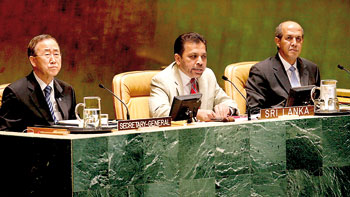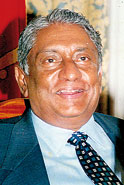The 1999 Resolution that declared Vesak an International Day of Observance at UN offices across the globe was described as “precedent-setting”. This commemoration of a religious day within the precincts of the UN last Monday was to be a first for any of the world’s religions.
From his place at the head of Sri Lanka’s Mission to the UN in New York at the time, Ambassador John Henricus De Saram enjoyed an insider’s understanding of the situation, even as he bore the responsibility of being Sri Lanka’s voice in the matter and its representative to the General Assembly. “I realize – that with Minister Lakshman Kadirgamar now gone – I am perhaps the “sole repository” of much that happened on the Vesak Resolution at the UN at that time,” he says.
The Sunday Times caught up with Ambassador De Saram, now in retirement in Baltimore, USA to relive the preparation, introduction and shepherding to a successful conclusion a historic resolution before the world’s biggest international organisation. The idea that Vesak should be considered for a UN holiday came out of the International Buddhist Conference in Colombo in November 1998 organised by the Ministry of Foreign Affairs under the stewardship of then Foreign Minister Kadirgamar. It was to be a carefully orchestrated move. The event was another first - 185 delegates were in attendance at this intergovernmental Buddhist Conference, convened by the Government of Sri Lanka. An integral part of Sri Lanka’s celebrations of 50 years of Independence, the Conference was by all accounts a fruitful and lively gathering of Buddhist scholars from all over the world. Out of it came seventeen recommendations, one of which was an international holiday to be observed on Vesak day.
 |
| UNSG Ban Ki moon and Dr Palitha Kohona at the Vesak Day ceremony held at UN Headquarters this week |
In a Ministry of Foreign Affairs Conference of Western Hemisphere Ambassadors in Colombo held in May the next year it was decided that the recommendations of the Conference would be implemented “as fully as possible,” says Mr. De Saram, adding that “very wide-ranging consultations began and continued with Permanent Missions and the relevant officials of the Secretariat.” Clearly, there was a plan and a plan implementation stratagem.
Addressing the UN General Assembly in the September of 1999, in the first week of the plenary debate, Minister Lakshman Kadirgamar was to say: “Allow me, therefore, to suggest to this August Assembly that as the third millennium of human history opens it would be fitting to recall the immense contribution to the understanding of the human condition that the teachings of the Buddha made two thousand five hundred years ago. I suggest further, Mr. President, that it would be appropriate to honour the Buddha by declaring that Vesak, the sacred day for Buddhists the world over, be observed as a special day by the United Nations... Mr. President, a Resolution to this effect sponsored by a number of countries will be introduced in the General Assembly, at the current session of the Assembly.
The Government of Sri Lanka would commend this Resolution to the attention of the General Assembly." These lines record the first time the subject of ‘International Recognition of the Day of Vesak’ was placed before the Assembly.
Though there would eventually be 34 co-sponsors, Sri Lanka was to take the lead in introducing the Resolution to the General Assembly. “Looking back now, it seems to me that it had much to do with the greatly respected place Sri Lanka holds in the doctrine and history of Buddhism,” says the one-time international civil servant who served in the UN’s Legal Department and whom Minister Kadirgamar hand-picked to represent the country at the world body.
As UN procedure demands, Minister Kadirgamar was required to submit a letter to the President of the General Assembly and copied to the Undersecretary-General for General Assembly Affairs, requesting that the subject be placed on the General Assembly’s agenda (for its 1999 session) – “as an additional item.” The letter had to be submitted before September 10 1999, in time for that year’s GA session on September 14 and the subsequent plenary debate on September 20. “Continuous consultations, prior and subsequent to such a Letter of Request, would of course be necessary with all delegations of countries that were represented at the Colombo Conference and with as many others as possible,” noted Mr. De Saram, anticipating the work that lay ahead.
However, Mr. De Saram suggested a modification in their request. Making reference to the debate surrounding the matter of UN holidays, he said: “It is recognized by many here that it was when former Secretary-General Perez de Cuellar (of Peru) moved to have “Good Friday” declared a United Nations holiday – that the question of UN holidays became so sensitive a topic.” Also fresh in their collective memories were the complications surrounding the Organization of Islamic Conference’s (OIC) move to have the UN to recognize Ramadan and Hajj as UN holidays. In a confrontation that had played out three years previously, in 1997, certain Western states had been forced to withdraw their opposition to the resolution in the face of overwhelming support from third world countries. Still, it left those considering a similar move understandably wary.
In a then confidential letter addressed to his Minister, Ambassador De Saram cautioned thus; “Judging from General Assembly consideration of similar matters in the past...were we to request that Vesak be declared a United Nations holiday – lengthy discussion and negative views are likely – an “unseemly possibility,” adding, “And, further, I have been cautioned that there would be “reopening” of a recent GA (Fifth Committee – Administrative & Budgetary Committee) decision that in future there would only be nine UN Holidays a year.” Several countries then would have their own religious holidays to propose and might oppose the Resolution.
Ambassador De Saram’s solution was to move for a ‘Day of Observance’ instead, which he described as “an alternative and clearly preferable course.” Such a proposal, which placed no serious demands on UN resources, could be placed directly before the General Assembly and did not have to be subject to ‘prior consideration’ before the Secretariat and other General Assembly groups dealing with administrative and budgetary matters. “Observances of Vesak - without administrative or budgetary implications for the UN - could be held at the UN which would not be closed - but open - with its auditoriums and halls useable for religious observances and Buddhist theological discussions,” wrote Ambassador De Saram to Minister Kadirgamar.
 |
| Lakshman Kadirgamar |
Though he concurred and chose to leave the matter in his Ambassador’s capable hands for most part, Minister Lakshman Kadirgamar’s role “from commencement to conclusion was of overall and pivotal importance to all Sri Lankan endeavours on the Vesak Resolution,” says the Ambassador. The two men remained in close contact during this period. The strong, open connection between the Ambassador and Minister, and Mr. Kadirgamar’s determination to throw the full weight of his support and influence behind the Resolution were to be deciding factors in its success. “Without his calm and commanding, and warm personality, and ‘pragmatic wisdom’ in handling matters pertaining to the UN - I do not wish to contemplate what the scenario might otherwise have been,” he confesses.
Though they were determined to resort to canvas far and wide for support, the team found many delegations were cautious about committing to co-sponsoring the Resolution. Ambassador De Saram attributes this to the Resolution being the first of its kind – “namely a Resolution that records General Assembly "recognition" of a particular religion; and, this seemed to give rise to some concern as to the "precedent-creating" effect of the Resolution; and the sensitivity of a number of delegations to that concern was understandable in view of the role of religion in the national contexts of many countries and in a number of conflict situations,” he explains. Nevertheless, they found unexpected allies in the likes of Iceland, Ireland, Slovakia, Spain, U.S.A, Turkey and even the Russian Federation.
“The Permanent Representative of the Russian Federation, Ambassador Sergie Lavrov, who I thanked for his co-sponsorship, said he had very happy memories of Sri Lanka (where he served as Ambassador) and remembers the Vesak celebrations.” Today that Ambassador Lavrov is Russia’s Foreign Minister.
Yet, we were aware that there was a “special uniqueness” to the Resolution (as compared to the many other resolutions requiring “home-capital clearance”) – at that very busy 1999 General Assembly. And that “uncertainties” among officials at “home-capitals, might perhaps mean obtaining “co-sponsorship” of the Resolution may in the circumstances be unattainable. We at the SL Mission were confident however, that the very warm relations between Sri Lanka, and China and Japan were such that both countries would have wished to see a Resolution proposed by Sri Lanka “have smooth passage”.
The atmosphere on that day, December 15 1999 in the General Assembly (after the records show a lengthy and very technical debate on “certain global problems for computers”) was excellent: “calm and dignified and appropriate” and to some of us in the General Assembly at the time “spiritually uplifting”. A “euphoria” as to what might be possible in the new millennium (at and through the United Nations) was already upon us - then - already an over-arching and inspiring phenomenon.
Alas, in reality, how naïve we all were says the retired diplomat.
An excerpt from 54/115, International recognition of the Day of Vesak at United Nations Headquarters and other United Nations offices reads: ‘The General Assembly…Considering that international recognition at United Nations Headquarters and other United Nations offices would constitute acknowledgement of the contribution that Buddhism, one of the oldest religions in the world, has made for over two and a half millennia and continues to make to the spirituality of humanity resolves that, without cost to the United Nations, appropriate arrangements shall be made for international observances of the Day of Vesak at United Nations Headquarters and other United Nations offices, in consultation with the relevant United Nations offices and with permanent missions that also wish to be consulted.’
On Vesak Day in the new Millennium, May 18, 2000, the UN observed the holy day in Buddhism, the first religious observance at the world body, and has been doing so ever since. |



